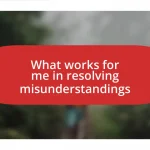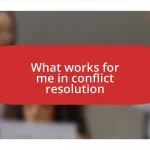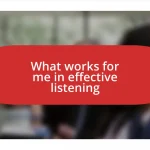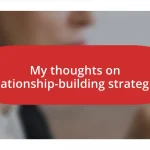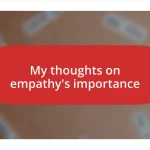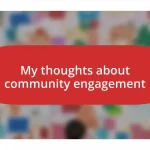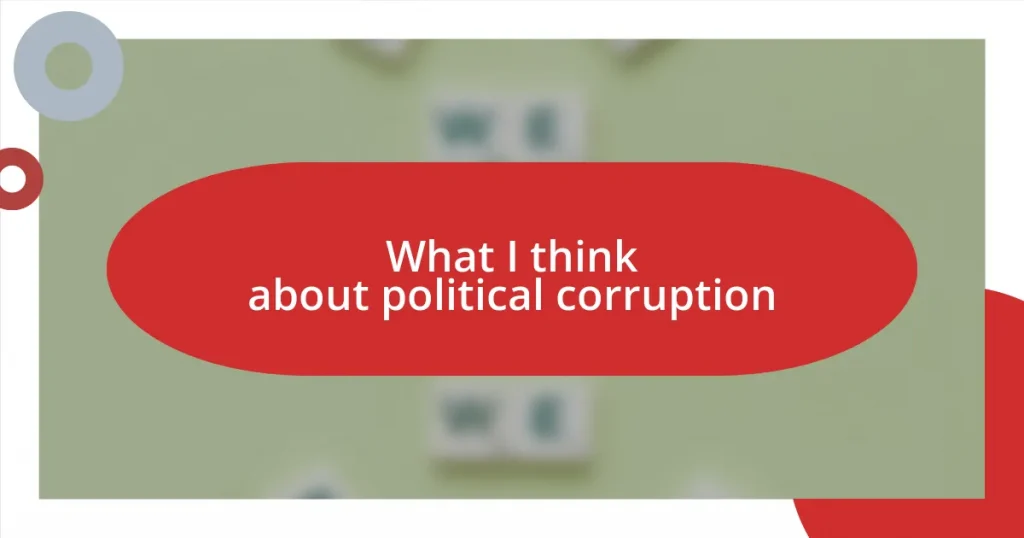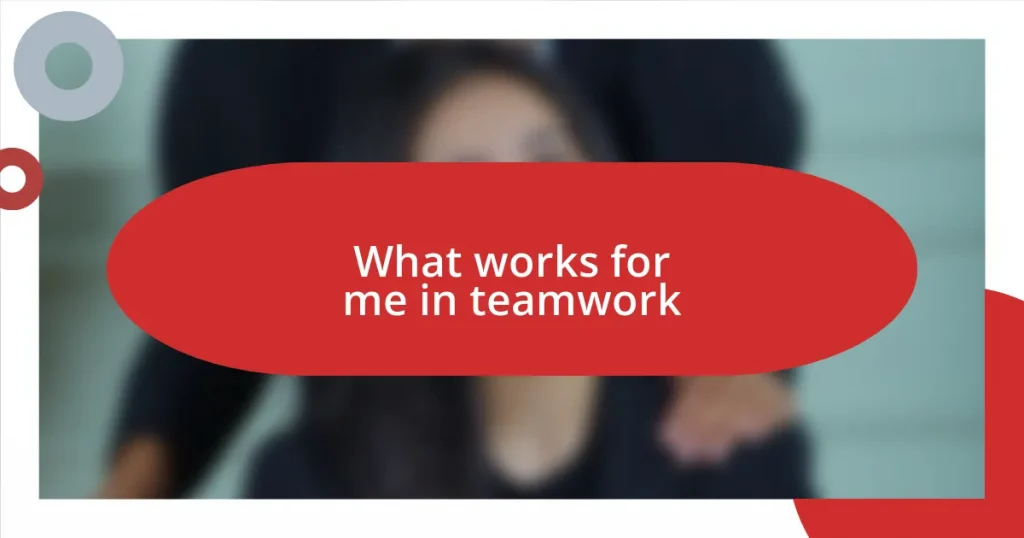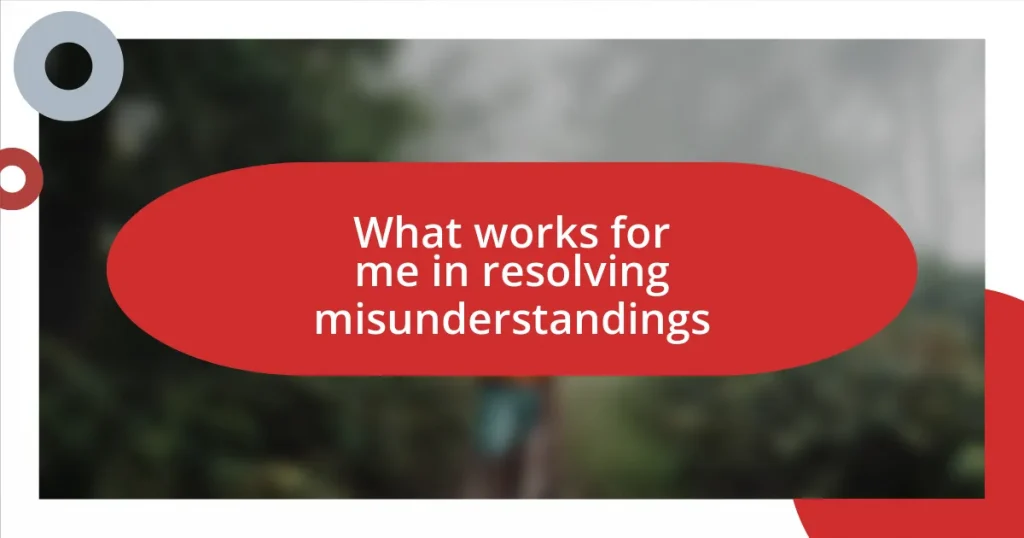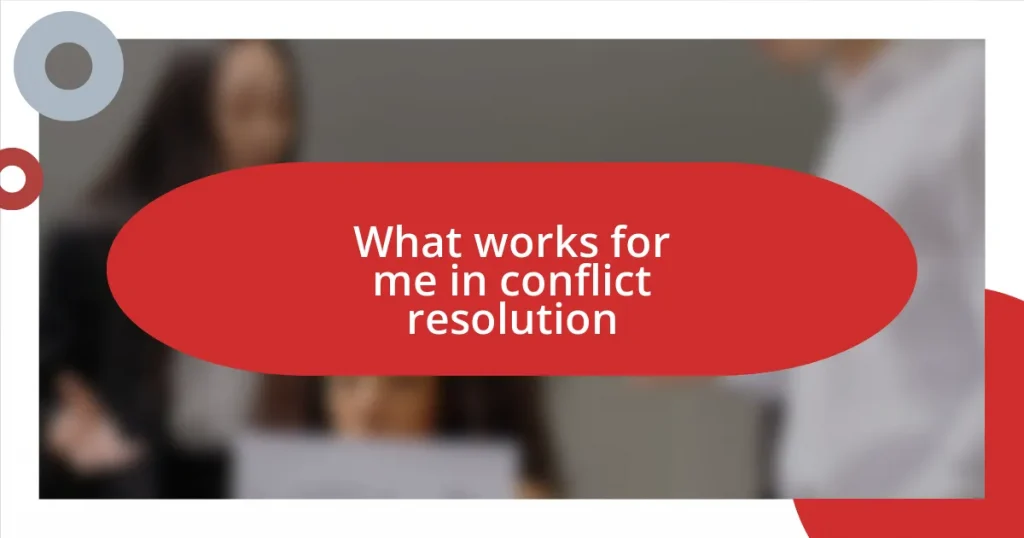Key takeaways:
- Political corruption undermines trust in government and manifests through bribery, embezzlement, and favoritism, leading to societal suffering.
- Key causes include lack of transparency, weak legal frameworks, and cultural acceptance of corrupt practices, which create environments conducive to corruption.
- The effects of corruption include misallocation of resources, stifled economic growth, and erosion of public trust, significantly harming community integrity and participation.
- Preventative measures involve advocating for transparency, educating citizens, and leveraging technology to foster accountability and civic engagement.
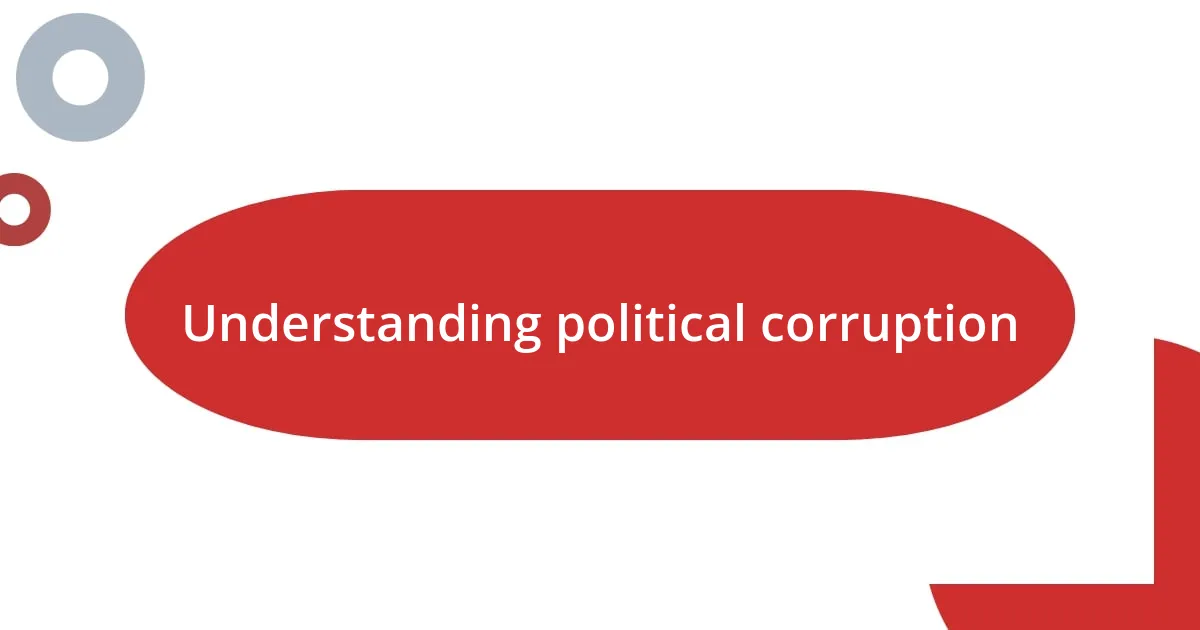
Understanding political corruption
Political corruption is a complex issue that goes beyond mere misconduct; it fundamentally undermines trust in government. I often recall a local election where candidates made bold promises, only to see them vanish once they were in office. Isn’t it disheartening when we realize that the very individuals we elect to represent us could be more entangled in personal interests than public ones?
At its core, political corruption can manifest in various ways: bribery, embezzlement, and favoritism, to name a few. I’ve witnessed firsthand how communities suffer when resources meant for public welfare are siphoned off for personal gain. How can anyone justify exploiting their position for selfish ends when the consequences ripple through society?
Moreover, the emotional toll of corruption extends beyond finances; it breeds cynicism and apathy among citizens. I remember speaking with friends after a scandal broke in our town. Their frustration was palpable, echoing a sentiment of hopelessness that is all too familiar. Can we truly expect positive change when faith in the system erodes? Understanding these layers of corruption is essential in navigating the intricate web of politics today.
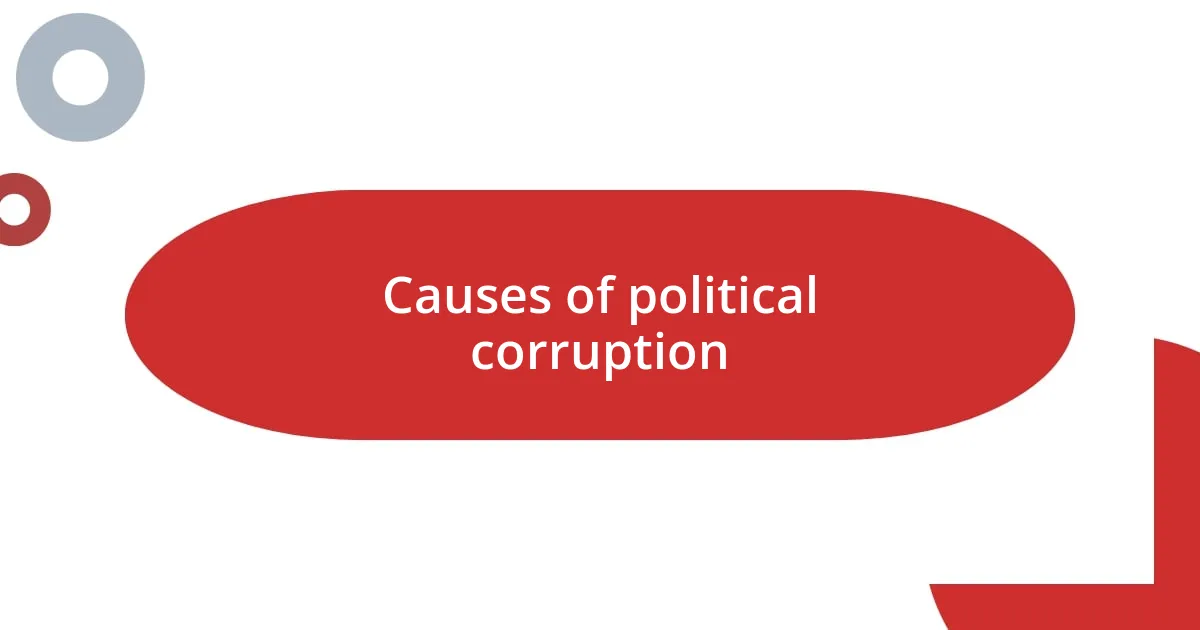
Causes of political corruption
It’s fascinating—yet troubling—to consider the root causes of political corruption. In my experience, one major factor is the lack of transparency within political systems. When decisions are made behind closed doors, it creates fertile ground for illicit activities. I still remember a heated town hall meeting where a proposed budget wasn’t fully disclosed. Many of us sensed something fishy, and that feeling of doubt lingered long after the meeting ended. Without accountability, individuals feel emboldened to prioritize their interests over the community’s welfare.
A few critical causes often recur in discussions around political corruption:
- Weak legal frameworks that fail to deter corrupt practices.
- Political instability, which often creates a power vacuum.
- Cultural norms that accept bribes as a typical part of doing business.
- Inadequate checks and balances, leading to unchecked power.
- The allure of power and wealth, which can corrupt even the most principled individuals.
Each of these factors contributes to an environment where corruption can thrive. It’s a cycle that’s difficult to break, but recognizing these causes is a step toward addressing the issue.
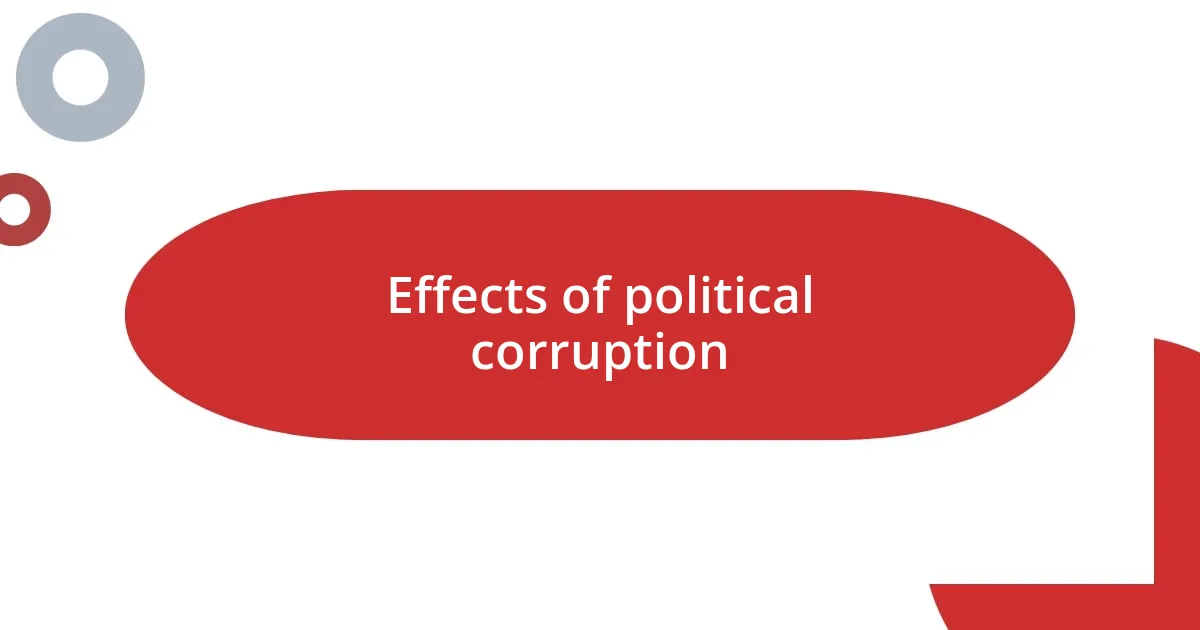
Effects of political corruption
The effects of political corruption are pervasive, impacting society on multiple levels. For instance, when funds are misallocated due to corrupt practices, essential services like education and healthcare suffer. I once spoke with a teacher who had to make do with outdated materials because the budget was mismanaged — her frustration was palpable. What about the children who miss out on quality education? It made me realize how deeply corruption can hurt the fabric of our communities.
On a broader scale, political corruption can stifle economic growth. When businesses have to pay bribes to operate, it creates an uneven playing field, discouraging honest entrepreneurs. I have encountered small business owners forced to navigate this murky landscape, feeling disillusioned by the system. How can we foster innovation and opportunity in an environment where integrity is compromised?
Ultimately, the most significant impact I’ve observed is the erosion of public trust. When scandals surface, the community is left disheartened, questioning the integrity of their leaders. There’s this sense of betrayal that lingers, often leading to lower voter turnout and civic participation. I reflect on my own hesitance to engage in local politics. How can we rebuild that trust when the scars of corruption run deep?
| Effect | Example |
|---|---|
| Impact on Essential Services | Misallocation of funds leads to inadequate education and healthcare, as witnessed in local communities. |
| Stifled Economic Growth | Businesses facing bribery create an uneven playing field, discouraging honest entrepreneurship. |
| Erosion of Public Trust | Scandals cause disillusionment, leading to lower civic engagement and voter turnout. |
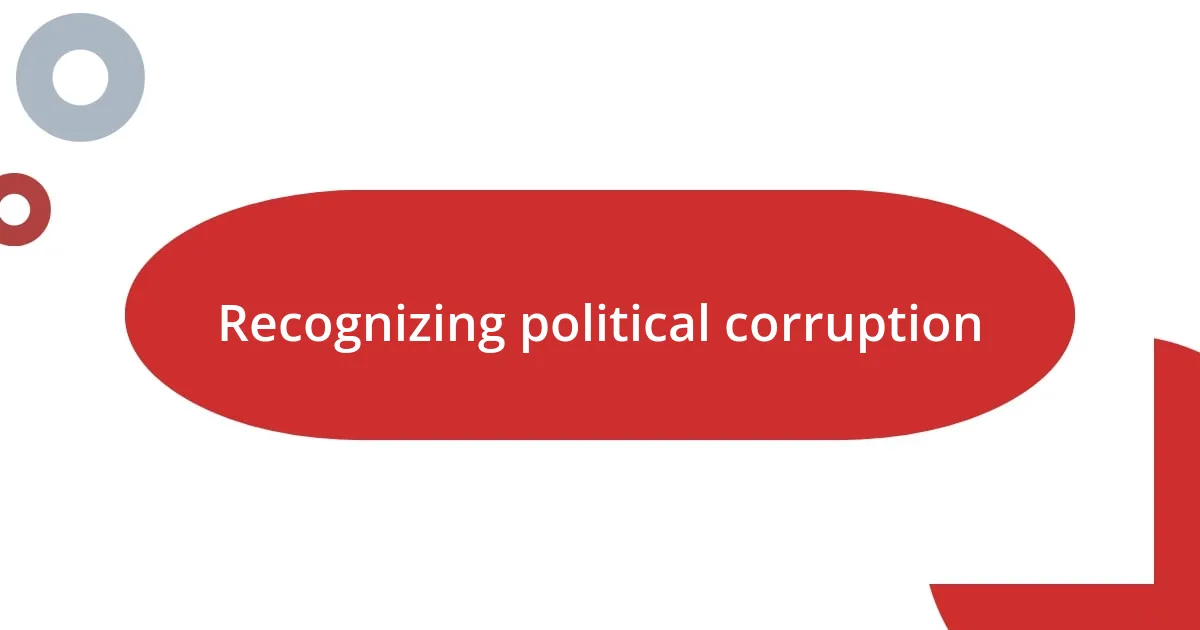
Recognizing political corruption
Recognizing political corruption can often feel like trying to find a needle in a haystack. I’ve had conversations with people who assume that corruption is always glaringly obvious, yet subtle forms often slip under the radar. For example, I once overheard a local politician casually dismissing budget discrepancies as mere “mistakes” instead of addressing them directly. This nonchalance can be a significant red flag, indicating a culture of avoidance and a lack of accountability.
One of the most telling signs I’ve experienced is when political promises seem too good to be true. I recall a local election where candidates promised community projects without outlining the sources of funding. It sparked my curiosity—how often do we take politicians at their word without questioning the feasibility? This lack of critical examination is common but dangerous. Being aware of these discrepancies helps us hold our leaders accountable and fosters a more engaged citizenry that demands transparency.
Sometimes, recognition starts with gut feelings. I remember attending a public meeting where a proposal felt rushed, almost as if they were trying to push it through before anyone could protest. That sense of unease is valid; it reflects a deeper fear that something may be hidden from public scrutiny. Might our instincts be more attuned to these issues than we realize? Understanding these emotional cues can empower us to seek more clarity, thereby shining a light on potential corruption that others might overlook.
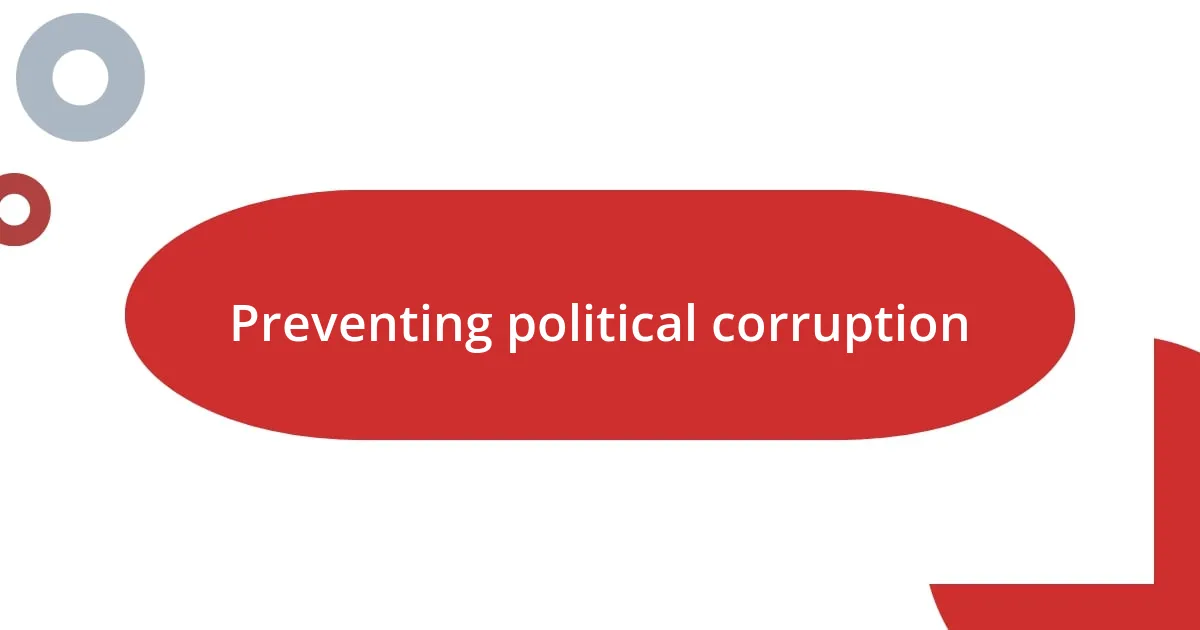
Preventing political corruption
To effectively prevent political corruption, a multi-faceted approach is essential. One strategy I’ve often seen emphasized is the implementation of stringent transparency laws. For instance, during a community forum, I listened as an advocate shared how open-access legislation in their state empowered citizens to scrutinize government spending. This sense of involvement fostered a culture of accountability, making leaders more cautious about their decisions. How often do we consider the power of transparency in making officials think twice before engaging in corrupt actions?
Another significant element in combating corruption is education. I vividly recall attending a workshop that focused on civic responsibility. The facilitator highlighted how informed citizens can demand change and hold their leaders accountable. By empowering ourselves with knowledge about our rights and the workings of government, we create a collective voice. Isn’t it fascinating how understanding our role in democracy can serve as a powerful deterrent against corruption?
Lastly, embracing technology offers innovative solutions. I remember experimenting with an app designed for reporting local issues directly to elected officials. The ease of reporting made me realize that when citizens are equipped with the right tools, it becomes much harder for corruption to flourish unchecked. How could the simple act of digital engagement reshape our political landscape for the better? By leveraging such modern tools, we not only increase transparency but also cultivate a spirit of activism among communities.
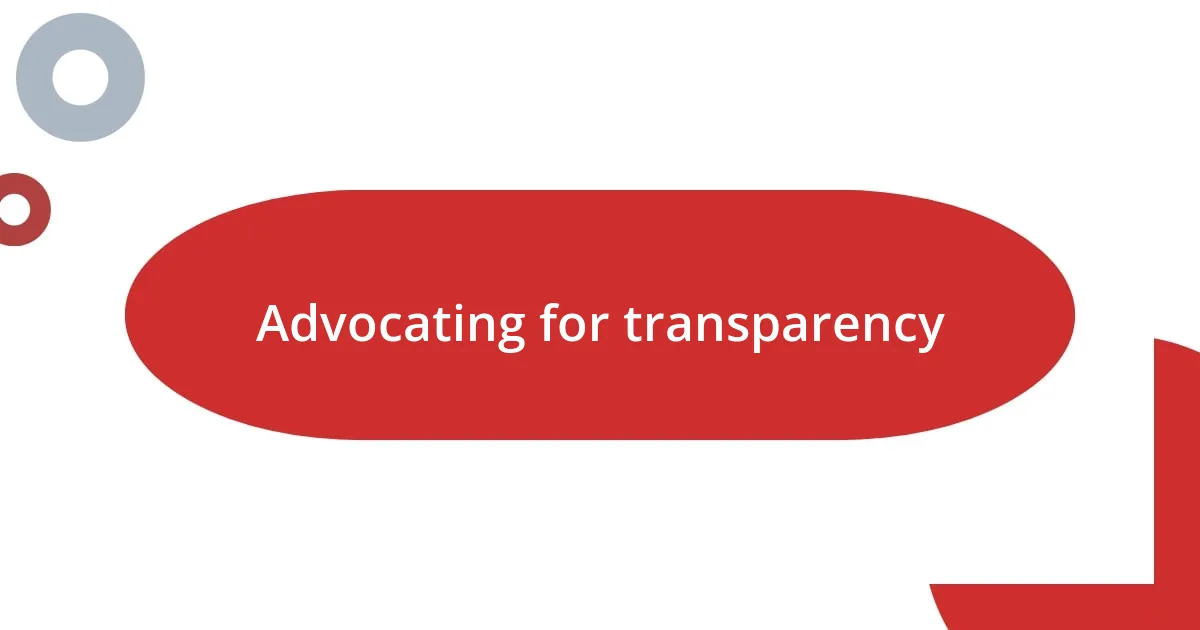
Advocating for transparency
Advocating for transparency is crucial in fostering trust within our political systems. I remember attending a town hall meeting where a local official passionately spoke about the importance of open communication between the government and the community. I couldn’t help but feel that this commitment to transparency was somewhat revolutionary in an era when many leaders prefer to operate behind closed doors. Have you ever wondered how much more informed we would be if politicians truly embraced this practice?
In my experience, transparency feels like a breath of fresh air in a dense fog of secrecy. Just recently, I read about a city council unveiling their budget process to the public through a user-friendly online platform. It amazed me how quickly community members engaged with the information. They sent inquiries, suggestions, and expressed their concerns, all because the data was accessible. Isn’t it remarkable how just breaking down barriers can lead to such vibrant community interaction?
Moreover, advocating for transparency encourages an atmosphere where questions are welcomed, not stifled. I recall speaking with a group of friends about a controversial policy change that seemed to have been decided without much public dialogue. As we delved deeper into the issue, one friend pointed out that transparency could have quelled many fears and misunderstandings. It hit me then—what if we made it a norm for our leaders to openly discuss their decisions and invite input? Perhaps with that shift, we could build a more informed citizenry, ready to participate actively in shaping their governance.
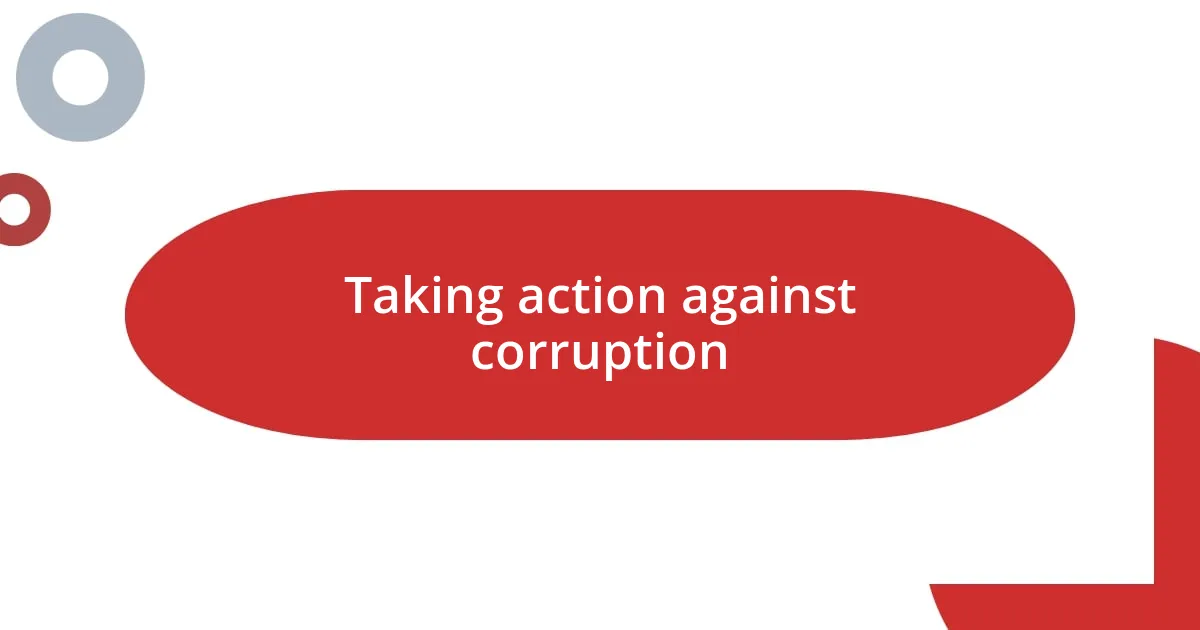
Taking action against corruption
Taking action against corruption requires more than policy changes; it often calls for grassroots movements that empower individuals. I recall joining a local initiative focused on mobilizing community members about corrupt practices in our city. The passion in the room was palpable, and that collective energy motivated us to gather signatures for a petition demanding accountability from our elected officials. It was a powerful reminder that when we unite, we become a formidable force against corruption. Have you ever felt that sense of community strength propelling you forward?
Equally important is the role of whistleblowers in fighting political corruption. I once sat down with a courageous individual who shared their heartbreaking story of exposing wrongdoings in their workplace. Despite facing backlash and threats, their commitment to integrity was unwavering. Listening to their experience made me realize how vital it is for us to support and protect those who dare to speak out. Have you thought about the impact one brave voice can have in shining a light on hidden corruption?
Another effective method to combat corruption is advocating for stricter enforcement of laws that punish corrupt behavior. I remember when I attended a rally advocating for stronger anti-corruption measures; there was such a palpable energy as speakers recounted stories of blatant injustices. It struck me that while laws exist, true change often hinges on our insistence that they be enforced. Isn’t it the responsibility of each of us to push for a system that holds every individual accountable, regardless of their position? Taking to the streets, engaging in dialogues, and voting are all ways to demand that our leaders act justly.

